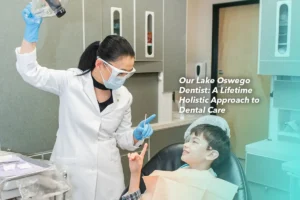Do you know that your baby has started making teeth as early as two months of your pregnancy? A baby begins making adult teeth at birth as they take 6-10 years to grow fully. So taking care of children’s teeth now is very important for their future. At every stage of life, an excellent dental condition and health ensure a better future for your child. Set your growing child up for strong adult teeth regardless of how many baby or adult teeth they have today.
Why Baby Teeth Are Important
We have found that some parents think that they don’t have to worry about their child’s baby teeth because the child will eventually lose these teeth for their permanent teeth. However, this is not the case.
According to the American Dental Association there are many reasons baby teeth need to be cared for:
- Baby teeth are essential to your child’s health and development. They help them chew, speak, and smile.
- Baby teeth hold space in the jaws for permanent teeth growing under the gums.
- When a baby tooth is lost too early, the permanent teeth can drift into the empty space and make it difficult for other adult teeth to find room when they come in. The result can be crowded or crooked teeth.
Starting your young one with good oral care protects their teeth for a lifetime.
Setting a Good Example
Your children love to copy what mom & dad do! They learn the most from watching their parents. By brushing and flossing together, you’ll get an excellent example for them and make their learning easier and faster.
Here is a guideline for caring for your child’s teeth:
- Begin cleaning your baby’s mouth during the first few days after birth by wiping the gums with a clean, moist gauze pad or washcloth. As soon as teeth appear, decay can occur. A baby’s front four teeth usually push through the gums at about six months, although some children don’t have their first tooth until 12 or 14 months.
- Children younger than three years should have their teeth brushed as soon as they begin to have teeth come in. Use a small amount of toothpaste — no more than a smear or the size of a grain of rice. Brush teeth thoroughly twice per day (morning and night) or as directed by a dentist or physician. As they learn to brush their teeth on their own, supervise their brushing to ensure they use the right amount of toothpaste and brush correctly.
- For children 3 to 6 years of age, use a pea-sized amount of toothpaste. Brush teeth thoroughly twice per day (morning and night) or as directed by a dentist or physician. Continue to supervise children’s brushing and remind them not to swallow the toothpaste.
- When your child has two teeth with a narrow or closed space, you should begin flossing between their teeth daily.
Another part of setting a good example is taking them to the dentist. When their teeth are still very new, and in good condition, their visit will be fun. Ideally, the first few visits should confirm all is good and help the child get used to the clinic’s environment. By introducing a dental clinic while your child is very young and trouble-free, you show the importance of regular professional visits for prevention. Taking a young child to a dentist only when treatment is needed, there are too many things to handle for the child–new people, new environment, new rules, and all–and it can be pretty overwhelming. Many dental patients’ phobia (fear and stress) originates from experiencing too many new, unfamiliar things–a common set-up during an emergency visit.
Final Words
“You never get a second chance to make a first impression.”
The first impression at the dentist’s office can become a lifelong memory, which can be a gift or curse depending on the experience. We care about your child’s future and believe an early, pleasant dental experience helps anyone feel more at ease at the dentist. By visiting a dentist early in life, your child will have a positive experience. Fond memories of a dentist early in life will keep future dental visits more routine and relaxing.
Uninformed, uncustomized, or poor oral care can lead to infection, disease, or other teeth problems and poor facial growth in aesthetics. Oral health problems can lead to more significant problems in the rest of their body. For example, respiratory health from teeth and tongue alignment is getting much attention to help children with ADD/ADHD, allergies, ear infections, and many other chronic medical conditions.
Children’s appointments are typically shorter than adult ones at our office. If the child allows it, a visit includes an exam, x-rays, and cleaning. However, a great first impression is crucial for your child’s future visits; this is our top priority! We are careful to watch for what each child can tolerate. Most importantly, we want to make your child’s visits to the dentist as pleasant as possible, so they form good memories about going to the dentist.
Please feel free to contact us if you want to schedule an appointment or have any questions about your child’s teeth.
Sincerely,
Dr. Manami Yamaguchi




